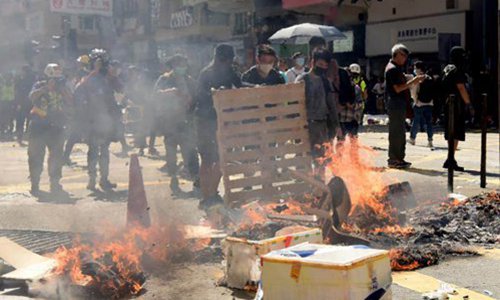HOME >> OPINION
Why Hong Kong middle class fails to see the sinister designs of radical protesters
By Zhang Jiwu Source:Global Times Published: 2019/11/20 22:08:40

Black-clad rioters set fire on a street in Sai Wan Ho in Hong Kong on November 11. Photo: Xinhua
Change is under way as the society in Hong Kong started to push back against the unrest sparked by the now-withdrawn extradition bill. People who love China and Hong Kong have been praised for their consistent stance during the chaos. In the meantime, many are reflecting on one question: Why have some middle-class citizens supported radical protesters?
Those who insisted they were "peaceful, rational and nonviolent" and refused to distance themselves from the so-called valiant protesters are also from the middle class. It is confusing that some middle-class Hongkongers support the unrest, which has caused irreversible losses to the city; and the opposition has gained an upper hand in public opinion and polls.
There are some reasons worthy of attention. First, affected by Western public opinion, a large part of local media in Hong Kong takes a negative view of the Chinese mainland leading to the middle-class forming such an opinion. Moreover, some domestic and foreign forces maliciously manipulate public opinion and misguide Hongkongers.
In the past, some Hong Kong residents had a superiority complex due to the city's faster economic growth compared to the mainland. However, amid rapid economic progress on the mainland, these people began to feel upset, anxious and even developed a dislike for the mainland.
Media reports and public opinion drive the middle-class's opinion in society. Therefore, there is some prejudice and misunderstanding about mainlanders among these people, who don't know what the Chinese mainland is really like. Such a misplaced impression of the mainlanders leads to prejudice among Hongkongers resulting in aggression toward their compatriots. As some analysts said, due to lack of knowledge, some members of the middle-class tend to accept notions that do not stand the test of reality.
Second, a large part of the middle-class is into stable and respectable jobs, such as being lawyers, teachers, media professionals, medical workers, although a majority of them are patriots who love the country and the city, there are also many who are neutral or pro-opposition. As they have a stable income, it will take some time before they start feeling the effect of economic losses due to the sustained unrest. Hence, they are likely to believe that the crisis is not serious enough to imperil their livelihood. Such being the case, they could be easily led to make irrational choices.
In addition, some of these people may want to take advantage of street movements to inject something exciting into their dreary routine. But given their social status, most of them would rather act as members of so-called "peaceful, rational and nonviolent" group.
Third, controlled by the opposition, many professional associations and labor unions of Hong Kong have soiled the image of affiliated middle-class professionals by trying to exercise control over them during the protests. Education professionals who fueled the unrest are a typical example.
The distortion of reality in Hong Kong would lead to awareness among more people. This will make them aware of the consequences of their paranoia. The future of Hong Kong is in the hands of the middle-class, more of whom should make choices wisely and fulfill their obligations to society.
The author is a professor at Peking University. opinion@globaltimes.com.cn
Posted in: VIEWPOINT